C.W. Thomas's Blog, page 3
July 19, 2016
Update: Book 3 - Somewhere Around Chapter 35
The further I venture into this series the more I find the story taking on a life of its own. This wasn't entirely unexpected. I created a chapter-by-chapter outline of the first four books, conceptualized the following four, and have left the final book up to fate.
I just didn't expect it to happen this quickly.
Last week I hit chapter 35 of book three and two of my seven main characters were ready to have their narratives reach a climax—and I still had ten chapters to go! The setting changed. The timing changed. These two characters suddenly came together and wanted to have a big finale—which was fine with me, but a little warning would've been nice.
The chapters that followed reminded me of the climax to book two, with short, rapid-fire moments that bounce from character to character catching different beats of action as the story slingshotted to the end.
It won't be long now, and draft one of book three will be complete.
Stay tuned,

I just didn't expect it to happen this quickly.
Last week I hit chapter 35 of book three and two of my seven main characters were ready to have their narratives reach a climax—and I still had ten chapters to go! The setting changed. The timing changed. These two characters suddenly came together and wanted to have a big finale—which was fine with me, but a little warning would've been nice.
The chapters that followed reminded me of the climax to book two, with short, rapid-fire moments that bounce from character to character catching different beats of action as the story slingshotted to the end.
It won't be long now, and draft one of book three will be complete.
Stay tuned,

Published on July 19, 2016 04:00
July 14, 2016
From Tohellwithit – Bad Driving Habits
Introduction
From Tohellwithit is a new series I'll be updating periodically with my optimistic pessimistic thoughts on life, love, and all the monotonous annoyances that ruffle my feathers. Through it I hope to amuse a few readers and provide myself a therapeutic outlet. Enjoy!
I love driving around and seeing the sights of Maui.
I hate how the locals drive.
PRO TIP
 If you ever come to a stop light in Maui, wait a few seconds after the light turns green before you actually go, otherwise you run the risk of getting T-boned by what I have affectionately come to call "a complete moron."
If you ever come to a stop light in Maui, wait a few seconds after the light turns green before you actually go, otherwise you run the risk of getting T-boned by what I have affectionately come to call "a complete moron."
It took me a while to figure this out. I'd be at an intersection three or four cars back. The light would turn green, but nobody would move.
"Move!" I'd say while lifting my hands up off the steering wheel, the universal gesture for, What in God's name are you people doing?
Then one day while approaching an intersection I watched the light turn red as I slowed to a stop, but the car ahead of me plowed through.
"He just ran a red light!" I declared to my wife. "That light turned red looong before he reached the white line. What a complete moron!"
Running red lights is so common in Maui that the locals have learned once a light turns green you need to wait a few seconds just in case there's a red light runner.
Too bad the cost of living in paradise has to be common sense.
From the blissful state of Tohellwithit,

From Tohellwithit is a new series I'll be updating periodically with my optimistic pessimistic thoughts on life, love, and all the monotonous annoyances that ruffle my feathers. Through it I hope to amuse a few readers and provide myself a therapeutic outlet. Enjoy!
I love driving around and seeing the sights of Maui.
I hate how the locals drive.
PRO TIP
 If you ever come to a stop light in Maui, wait a few seconds after the light turns green before you actually go, otherwise you run the risk of getting T-boned by what I have affectionately come to call "a complete moron."
If you ever come to a stop light in Maui, wait a few seconds after the light turns green before you actually go, otherwise you run the risk of getting T-boned by what I have affectionately come to call "a complete moron."It took me a while to figure this out. I'd be at an intersection three or four cars back. The light would turn green, but nobody would move.
"Move!" I'd say while lifting my hands up off the steering wheel, the universal gesture for, What in God's name are you people doing?
Then one day while approaching an intersection I watched the light turn red as I slowed to a stop, but the car ahead of me plowed through.
"He just ran a red light!" I declared to my wife. "That light turned red looong before he reached the white line. What a complete moron!"
Running red lights is so common in Maui that the locals have learned once a light turns green you need to wait a few seconds just in case there's a red light runner.
Too bad the cost of living in paradise has to be common sense.
From the blissful state of Tohellwithit,

Published on July 14, 2016 04:00
July 12, 2016
World, Meet My Son
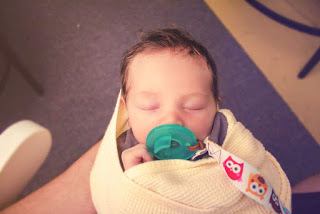 My son has arrived! He weighed 8 pounds, 10 ounces, and was 22 inches long. His name is Tobias Alexander (when I'm mad at him), but most of the time we just call him Toby.
My son has arrived! He weighed 8 pounds, 10 ounces, and was 22 inches long. His name is Tobias Alexander (when I'm mad at him), but most of the time we just call him Toby.If I could use one word to sum up what I witnessed as my wife labored and gave birth, it would be strength. I saw my wife do the miraculous. I saw her push past limits I never knew she had. I saw two midwives watch stunned at not only the long, hard labor she endured, but the steadfast, resilient, determined, way she handled it with no meds, no hospitals, and after 24 hours of no sleep.
Several times the midwives made remarks like, "Your pain threshold is unbelievable," "You haven't complained once," and "I wish more women handled labor like this."
They were in awe. I was in awe. I've never been more honored to call myself her husband than I am today.

My favorite moment.Toby was doing fine until his head emerged. His right hand was trapped behind his head by his umbilical cord that was also wrapped around his neck. There were a few moments of worry as the midwives worked to get him free of his little tangled mess.
When he finally came free of the birth canal, the midwives tried to get him to breathe, but he wouldn’t make any noise. They cleared his nose and mouth of fluid, but he still wouldn’t suck in air.
Dani started praying out loud, “Dear Jesus, help Toby breathe.” The midwives said, “Talk to your baby. Let him hear your voice.” “Breath, Toby,” Dani said. “Come on, Toby.”
That’s when I leaned down real close to him and said, “Hey Toby. This is your daddy. You need to breathe buddy.”
And at the sound of my voice he inclined his head to me and squeaked for the first time.

Published on July 12, 2016 04:00
July 7, 2016
Dear Manuscript: No, You Can't Drive
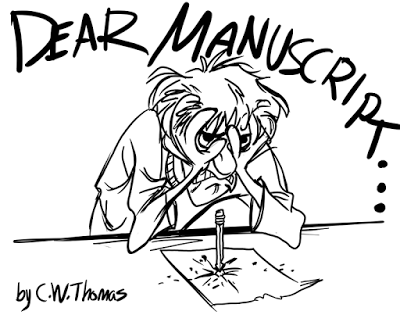
We started out on this journey together with a working understanding of each other's roles. Or so I thought.
I was the driver. You were the road. I was making the turns, reading the maps, deciding if west was better than east or if a pitstop couldn't wait until the next Burger King where I could get a large fry and an ice cold Dr. Pepper.
But you decided Dr. Pepper wasn't worth waiting for. You wanted to stop at McDonald's for a far inferior Coke from a watered down soda machine. So you took over. I don't know when, but somehow you managed to wiggle yourself down into the driver's side and plop me in the passenger's seat strap me into a carseat in the back like a wailing infant. Just who do you think you are?
We need to find a way to work together again. I understand that you've got your own ideas, and that most of them stem from nothing more than intuition, but sometimes we need to plan ahead. (I'm sorry, but Prince Tristian Elle cannot become king of Tranent. It doesn't make sense, no matter how much you want it to. I think. Actually, I don't know about that one yet. It might be kind of fun.)
But I digress.
Let's reevaluate, because my plans for this series are flying wildly off course and I think it's because I've given you the reins one too many times. You had a few good ideas, but it's over. This is a partnership, not a dictatorship. We're like the United States from a hundred years ago, not this tyrannical do-whatever-the-hell-it-wants governing body ruling over us now.
So calm down with your fly-by-the-pants ideas and let's work together on this. We're only at book three with six more to go. Capisce?
Your backseat writer,

Dear Manuscript is an ongoing series by author C.W. Thomas discussing his frustration with those annoying voices in his head.
Click here to read more.
Published on July 07, 2016 04:00
July 5, 2016
Dear Manuscript: Where Do We Go From Here?
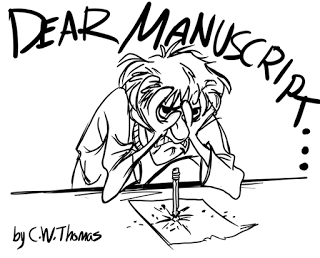
Dear Manuscript is a series by author C.W. Thomas updated periodically with his thoughts on the hair-pulling frustrations of being a writer. The characters in his manuscript talk to him, and so this is his outlet to talk back. It's sort of a "Dear Diary" meets a Michael Bay film, but no boobs. Please like and comment and give this indie writer some love.
Thanks!

Dear Manuscript is an ongoing series by author C.W. Thomas discussing his frustration with those annoying voices in his head.
Click here to read more.
Published on July 05, 2016 04:00
June 23, 2016
Is Rewriting While Writing A Crime?
Is it okay for a writer to stop part-way through a first draft to go back and rewrite something?
Ooh, rewriting while writing. Tsk, tsk. This question comes up a lot among writers, and I don't entirely understand why.
Writing is a creative process. If you overthink it you'll lose that creative edge, that part of you that imbues the writing with the most... you. Keep in mind I'm talking about the creative aspect of writing here, not editing or proofreading or punctuation or any other technical aspect. Those come later.
In the beginning, you just need to get out of you what's inside you. Get that first draft done by any and all means necessary. If that means going back and rewriting something, do it! If you think it will slow you down then write a note to yourself about what you want to rewrite so you don't forget, and keep going.
Just write.
It frustrates me when I see writers getting hung up on questions like this. I've been writing novels since I was 15 years old, and it never occurred to me that going back to rewrite something as I was still writing might be wrong. I never asked if I should be outlining or not. I never wondered about what writing software to use. I just wrote.
And wrote, and wrote, and wrote.
The great majority of writers barely finish one novel. By the time I was 17, I had written three, one of which was published. To date I've completed nine.
Proceed with cautionIf you do go back to rewrite something, don't start editing.
EXAMPLE
I'm working on chapter twenty-six of book three in my medieval fantasy series Children of the Falls. I just recently went all the way back to chapter one to re-write something—I wanted to write a secondary character into a certain scene. As I read through what I had already written I noticed typos, misspellings, passive voice, but I ignored all of it. I'll clean that stuff up in editing. My objective—my only objective—was to rewrite a portion of a scene to include a secondary character. That's it. Done. Moving on.
My point is simple. Do whatever you got to do to get that first draft down. Don't worry about how I do it. Don't worry about how J.K. Rowling does it. Stop perusing writing forums and Facebook pages asking formatting questions and comparing your process to the processes of others.
Just. Write.

Ooh, rewriting while writing. Tsk, tsk. This question comes up a lot among writers, and I don't entirely understand why.
Writing is a creative process. If you overthink it you'll lose that creative edge, that part of you that imbues the writing with the most... you. Keep in mind I'm talking about the creative aspect of writing here, not editing or proofreading or punctuation or any other technical aspect. Those come later.
In the beginning, you just need to get out of you what's inside you. Get that first draft done by any and all means necessary. If that means going back and rewriting something, do it! If you think it will slow you down then write a note to yourself about what you want to rewrite so you don't forget, and keep going.
Just write.
It frustrates me when I see writers getting hung up on questions like this. I've been writing novels since I was 15 years old, and it never occurred to me that going back to rewrite something as I was still writing might be wrong. I never asked if I should be outlining or not. I never wondered about what writing software to use. I just wrote.
And wrote, and wrote, and wrote.
The great majority of writers barely finish one novel. By the time I was 17, I had written three, one of which was published. To date I've completed nine.
Proceed with cautionIf you do go back to rewrite something, don't start editing.
EXAMPLE
I'm working on chapter twenty-six of book three in my medieval fantasy series Children of the Falls. I just recently went all the way back to chapter one to re-write something—I wanted to write a secondary character into a certain scene. As I read through what I had already written I noticed typos, misspellings, passive voice, but I ignored all of it. I'll clean that stuff up in editing. My objective—my only objective—was to rewrite a portion of a scene to include a secondary character. That's it. Done. Moving on.
My point is simple. Do whatever you got to do to get that first draft down. Don't worry about how I do it. Don't worry about how J.K. Rowling does it. Stop perusing writing forums and Facebook pages asking formatting questions and comparing your process to the processes of others.
Just. Write.

Published on June 23, 2016 22:00
June 20, 2016
Author Interview: John L. Monk
"Just ask yourself how many times in your life you've been forced to go to the emergency room. ... Even without the skills of our forebears, human life is delicate and nature is brutal."—JOHN L. MONK
I came across John L. Monk's "Kick" while searching for something to read on a flight to Hawai'i in January 2015. John's intriguing story, sharp prose, and clever wit hooked me from the get-go and I've been a fan ever since.
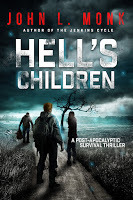 Buy Hell's ChildrenHis latest book, "Hell's Children," just hit the market. Though a departure from his usual genre it's a great read, and John's distinctive style isn't lost. The story revolves around a group of teenagers who find themselves the sole survivors of a sickness that has wiped out everyone over the age of sixteen. This story of survival pits society's "cabbages," teens who can only thrive in a coddling environment, against the "weeds," those tough-as-nails kids willing to do what it takes to survive.
Buy Hell's ChildrenHis latest book, "Hell's Children," just hit the market. Though a departure from his usual genre it's a great read, and John's distinctive style isn't lost. The story revolves around a group of teenagers who find themselves the sole survivors of a sickness that has wiped out everyone over the age of sixteen. This story of survival pits society's "cabbages," teens who can only thrive in a coddling environment, against the "weeds," those tough-as-nails kids willing to do what it takes to survive.
To celebrate the release of his new book—and partly because I'm just plain nosy—I asked John for an interview, which he generously provided.
C.W. Ok, first of all, if the scenario in Hell’s Children actually happened, would John L. Monk be a cabbage or a weed?
J.L.M. Hah, I first conceived the whole "cabbages and weeds" view of the world by reading the autobiography of Ben Franklin and thinking, "Wow, he ran away at fourteen to start a business. Can you imagine the pampered, texting, video game-playing kids these days doing anything so gutsy, so ambitious?" I thought about the hard life Ben and the early Americans lived and how they could do so incredibly much: build a house from the raw materials at hand, feed themselves off the land, make their own clothing, birth a nation. Amazing stuff.
And to answer your question, I'd totally be a cabbage. I don't know how to do any of that stuff. Sure, I can fish, kill some poor deer or something and try to eat it. But to write the book, I spent a lot of time on Youtube figuring stuff out, reading articles online, that kind of thing. In a post-apoc situation, the Internet goes away. Danger lurks everywhere. Just ask yourself how many times in your life you've been forced to go to the emergency room. I can count six or seven times, all of them potentially life threatening. Even without the skills of our forebears, human life is delicate and nature is brutal.
The character Jack is unique. His survivalist parents taught him lots of stuff that’s lost on kids today. Is this how you were raised? If not, how did you devise Jack’s upbringing? Did you watch a lot of “Doomsday Preppers?”
Me raised like that? Heck no. I was raised by Jack Tripper and Andy Griffith and Whatchu-talkin'-bout-Willis. I watched a lot of TV. Ok, not entirely true—I went fishing a lot, ran out in the woods looking for snakes, shot guns while visiting my great grandparents in West Virginia, but that was about as grizzled as it got. My education was limited to whatever I could scrape from school and still get a passing grade. Mostly, I read fantasy and science fiction. That, at least, gave me some perspective on the level of my ignorance. To counteract that, I suppose that's why I got a degree in Anthropology. I learned a lot from that—how to think about people and understand why they do things. Empathy has been my biggest strength as a writer.
Oh, and about "Doomsday Preppers"—that show really bugs me. I love seeing all the preppers, what they do, all the ideas and stuff. But then along comes the stupid Nat Geo know-it-all at the end telling us (the audience) just how implausible the various doomsday scenarios are. And the arguments they use are pretty indefensible—provided there's no one around to defend against them, in which case they get to "win" or whatever. So I stopped watching it.
I couldn't agree more. The so-called "reality TV" is all about making fun of people. There's very little "real" about any of it.
If you want good survival stuff, go listen to podcasts like "The Survivalist Prepper Podcast" or "The Survival Podcast," or check out forums like "survivalistboards.com." The TV stuff is heavily-edited, exploitative, and unfair.
Your book explores some pretty dark aspects of humanity, and what teenagers of today might become in a world without electricity, supermarkets, and adult supervision. What sort of experiences have you had, or what research did you do, to capture all of that so vividly?
To be honest, I still remember what it was like in high school, on the playground, on the baseball team when the coach wasn't looking. Kids can be vicious, cruel, and shockingly stupid. And the ones that aren't are victims to the ones that are. Just look at some of the more famous "bullying" videos on YouTube and you'll see. But for a handy camera at the right time, those stories would never have seen the light of day. As for research, every day on Facebook turns up story after story of boys or girls beating up some old person for "disrespecting" them (if a reason is given at all). The research is all around us, it's abhorrent, and it's just getting worse.
Post-apocalyptic fiction isn’t a genre you’ve explored before. What made you decide to tackle this subject?
I've always loved the genre. I've read about twenty "Death Lands" novels by James Axler, "One Second After," "Lucifer's Hammer," "Alas Babylon," "The Stand," "Z For Zachariah," and a bunch more I can't recall. I love The Walking Dead. It's interesting to me. And there's an audience for it. I'm a writer. I sit in a chair for hours at a time sweating over commas and stuff—it's a lot of work. And when I'm done writing something, I want it to be read. Writing in a popular genre that I personally enjoy is a great payoff for all that work.
But despite the personal benefit (money, ego-stroking), I also wanted to talk about "kids these days." The story is sort of a wake-up call. Go read Angela's Ashes. Frank McCourt used to watch the men of Limerick ride the coal wagon to the mines every day. He describes all the kids standing along the road watching them, dreaming of the day they could do the same. Can you imagine "kids these days" wanting to work in a coal mine? Any kid caught wanting such a thing would be seen as an aberration—a "chump" for wanting to do hard work like a grownup. Smart kids in school are called nerds, at best, and beaten up at worst. Not that there's a lot of kids getting smart in schools these days, but that's another discussion.
Post-apocalyptic novels are the rage these days. How were you influenced by other books in this genre, and how did you design “Hell’s Children” to stand apart?
Those books I mentioned were heavy influences. I would read them and think, "What would I do in this situation?" With my limited survival knowledge, I rarely had a good answer. So that's another great reason I chose children to survive the apocalypse, and it goes back to the whole "cabbages and weeds" thing: I'm simply not that smart. I think I have a lot of empathy, so I know how kids would behave—how humans would behave. But knowing how to survive on my own without the benefits of civilization requires research. And research is time consuming. If I write about kids undergoing a terrible calamity (like all the adults dying), suddenly I don't have so much research.
Smart move. And it makes your story feel all the more plausible.
Exactly. Like me, the kids don't know very much. Shoot an animal, cut off a piece and eat it? Makes perfect sense to the cabbages in the story. For Jack's character, I had to research how to field dress an animal, and what parts you'd consume if you wanted to survive (hint: the organs—that's where all the vitamins and minerals are). So writing about kids was a great way to focus on story and less on data. Motivations and cause and effect. That's what people read books for. Not data.
I’ve always admired your prose. It’s concise, it’s clever, and very direct. Tell us about your writing process. What does it look like? How do you best like to work? Do you have any weird quirks? Do you write naked?
Haha. No, I've never written while naked. Too many dangly bits to deal with.
And thank you for the compliment on my typing practice—I try my best. Well actually, that's not entirely true. I make a serious effort to write something good, I read it a bunch of times, changing as I go along, get it edited, read it again two to three more times, changing as I go (putting in new typos and stuff), then I publish it. Then very nice readers tell me quietly about the remaining typos, which freaks me out (I get embarrassed about that kind of thing) and I go put the fixes in and hope nobody notices.
You do that too? No way!
And I write direct prose because when I try to write flowery stuff it comes out contrived. Sometimes I turn a pretty little phrase here and there, and that's always great. I try to get maybe one good turn of phrase in per chapter. Something memorable, if possible. Usually it's something funny. But I don't dress up every page in purple prose. And I don't have any weird quirks that I know of. I suppose you could say I pants all my novels, but a lot of people do that. I macro-outline the general story I wanna write, whether that happens or not. I jot a few sentences at the top of each chapter saying where I would like it to go (again, whether that happens or not).
What does John L. Monk like to do when he's not writing?
Read, eat, take naps, go to the movies, go out to eat (the dining experience), drink whiskey and hang out with my wife, or hang out with friends. I like fishing, but only if it's convenient, and right now it isn't. Really, I get a lot of enjoyment from the indie writing community. I love corresponding with other authors, seeing what they're up to, hearing them on various podcasts. Great fun.
What sorts of things have you learned about yourself while writing?
I guess the biggest thing I've learned is that I can start a difficult project, finish it, and not screw it up too badly. Finishing a novel is a major thing. Lots of people have tried, but only a small percentage of the ones who tried ever managed it. I've finished five so far, and that's a real confidence builder.
What books are you reading right now? Any new indie authors we should check out?
At the moment, I'm reading "Mutation" by Nerys Wheatley. It's a cool book with a different take on zombies. I'm also re-reading "Turning Pro" by Steven Pressfield. If you're a writer, read it. Also read it if you're anything else—the stuff in that book applies to just about everyone.
Have we seen the end of Jack and the “Hell’s Children”?
I sure hope not. I'm hammering away naked right now trying to write the next one! I hope to get it out before September, because of Amazon's horrible 90-day cliff where they drop you off the radar. But I won't compromise quality for speed. Once the book is ready, I'll think up a series name (ugh), slap that on both covers, and get it out there. Hopefully sales stay strong throughout. There's nothing more motivating than steady sales of book one when you're trying to write book two.
I think Jack is a fascinating character with a lot of potential. I look forward to where you take the story from here.
Read more about John's work at john-l-monk.com. "Hell's Children" is available now on Amazon, and don't forget to check out John's other books, including "Kick," "Fool's Ride," "Hopper House," and "Thief's Odyssey."

I came across John L. Monk's "Kick" while searching for something to read on a flight to Hawai'i in January 2015. John's intriguing story, sharp prose, and clever wit hooked me from the get-go and I've been a fan ever since.
 Buy Hell's ChildrenHis latest book, "Hell's Children," just hit the market. Though a departure from his usual genre it's a great read, and John's distinctive style isn't lost. The story revolves around a group of teenagers who find themselves the sole survivors of a sickness that has wiped out everyone over the age of sixteen. This story of survival pits society's "cabbages," teens who can only thrive in a coddling environment, against the "weeds," those tough-as-nails kids willing to do what it takes to survive.
Buy Hell's ChildrenHis latest book, "Hell's Children," just hit the market. Though a departure from his usual genre it's a great read, and John's distinctive style isn't lost. The story revolves around a group of teenagers who find themselves the sole survivors of a sickness that has wiped out everyone over the age of sixteen. This story of survival pits society's "cabbages," teens who can only thrive in a coddling environment, against the "weeds," those tough-as-nails kids willing to do what it takes to survive.To celebrate the release of his new book—and partly because I'm just plain nosy—I asked John for an interview, which he generously provided.
C.W. Ok, first of all, if the scenario in Hell’s Children actually happened, would John L. Monk be a cabbage or a weed?
J.L.M. Hah, I first conceived the whole "cabbages and weeds" view of the world by reading the autobiography of Ben Franklin and thinking, "Wow, he ran away at fourteen to start a business. Can you imagine the pampered, texting, video game-playing kids these days doing anything so gutsy, so ambitious?" I thought about the hard life Ben and the early Americans lived and how they could do so incredibly much: build a house from the raw materials at hand, feed themselves off the land, make their own clothing, birth a nation. Amazing stuff.
And to answer your question, I'd totally be a cabbage. I don't know how to do any of that stuff. Sure, I can fish, kill some poor deer or something and try to eat it. But to write the book, I spent a lot of time on Youtube figuring stuff out, reading articles online, that kind of thing. In a post-apoc situation, the Internet goes away. Danger lurks everywhere. Just ask yourself how many times in your life you've been forced to go to the emergency room. I can count six or seven times, all of them potentially life threatening. Even without the skills of our forebears, human life is delicate and nature is brutal.
The character Jack is unique. His survivalist parents taught him lots of stuff that’s lost on kids today. Is this how you were raised? If not, how did you devise Jack’s upbringing? Did you watch a lot of “Doomsday Preppers?”
Me raised like that? Heck no. I was raised by Jack Tripper and Andy Griffith and Whatchu-talkin'-bout-Willis. I watched a lot of TV. Ok, not entirely true—I went fishing a lot, ran out in the woods looking for snakes, shot guns while visiting my great grandparents in West Virginia, but that was about as grizzled as it got. My education was limited to whatever I could scrape from school and still get a passing grade. Mostly, I read fantasy and science fiction. That, at least, gave me some perspective on the level of my ignorance. To counteract that, I suppose that's why I got a degree in Anthropology. I learned a lot from that—how to think about people and understand why they do things. Empathy has been my biggest strength as a writer.
Oh, and about "Doomsday Preppers"—that show really bugs me. I love seeing all the preppers, what they do, all the ideas and stuff. But then along comes the stupid Nat Geo know-it-all at the end telling us (the audience) just how implausible the various doomsday scenarios are. And the arguments they use are pretty indefensible—provided there's no one around to defend against them, in which case they get to "win" or whatever. So I stopped watching it.
I couldn't agree more. The so-called "reality TV" is all about making fun of people. There's very little "real" about any of it.
If you want good survival stuff, go listen to podcasts like "The Survivalist Prepper Podcast" or "The Survival Podcast," or check out forums like "survivalistboards.com." The TV stuff is heavily-edited, exploitative, and unfair.
Your book explores some pretty dark aspects of humanity, and what teenagers of today might become in a world without electricity, supermarkets, and adult supervision. What sort of experiences have you had, or what research did you do, to capture all of that so vividly?
To be honest, I still remember what it was like in high school, on the playground, on the baseball team when the coach wasn't looking. Kids can be vicious, cruel, and shockingly stupid. And the ones that aren't are victims to the ones that are. Just look at some of the more famous "bullying" videos on YouTube and you'll see. But for a handy camera at the right time, those stories would never have seen the light of day. As for research, every day on Facebook turns up story after story of boys or girls beating up some old person for "disrespecting" them (if a reason is given at all). The research is all around us, it's abhorrent, and it's just getting worse.
Post-apocalyptic fiction isn’t a genre you’ve explored before. What made you decide to tackle this subject?
I've always loved the genre. I've read about twenty "Death Lands" novels by James Axler, "One Second After," "Lucifer's Hammer," "Alas Babylon," "The Stand," "Z For Zachariah," and a bunch more I can't recall. I love The Walking Dead. It's interesting to me. And there's an audience for it. I'm a writer. I sit in a chair for hours at a time sweating over commas and stuff—it's a lot of work. And when I'm done writing something, I want it to be read. Writing in a popular genre that I personally enjoy is a great payoff for all that work.
But despite the personal benefit (money, ego-stroking), I also wanted to talk about "kids these days." The story is sort of a wake-up call. Go read Angela's Ashes. Frank McCourt used to watch the men of Limerick ride the coal wagon to the mines every day. He describes all the kids standing along the road watching them, dreaming of the day they could do the same. Can you imagine "kids these days" wanting to work in a coal mine? Any kid caught wanting such a thing would be seen as an aberration—a "chump" for wanting to do hard work like a grownup. Smart kids in school are called nerds, at best, and beaten up at worst. Not that there's a lot of kids getting smart in schools these days, but that's another discussion.
Post-apocalyptic novels are the rage these days. How were you influenced by other books in this genre, and how did you design “Hell’s Children” to stand apart?
Those books I mentioned were heavy influences. I would read them and think, "What would I do in this situation?" With my limited survival knowledge, I rarely had a good answer. So that's another great reason I chose children to survive the apocalypse, and it goes back to the whole "cabbages and weeds" thing: I'm simply not that smart. I think I have a lot of empathy, so I know how kids would behave—how humans would behave. But knowing how to survive on my own without the benefits of civilization requires research. And research is time consuming. If I write about kids undergoing a terrible calamity (like all the adults dying), suddenly I don't have so much research.
Smart move. And it makes your story feel all the more plausible.
Exactly. Like me, the kids don't know very much. Shoot an animal, cut off a piece and eat it? Makes perfect sense to the cabbages in the story. For Jack's character, I had to research how to field dress an animal, and what parts you'd consume if you wanted to survive (hint: the organs—that's where all the vitamins and minerals are). So writing about kids was a great way to focus on story and less on data. Motivations and cause and effect. That's what people read books for. Not data.
I’ve always admired your prose. It’s concise, it’s clever, and very direct. Tell us about your writing process. What does it look like? How do you best like to work? Do you have any weird quirks? Do you write naked?
Haha. No, I've never written while naked. Too many dangly bits to deal with.
And thank you for the compliment on my typing practice—I try my best. Well actually, that's not entirely true. I make a serious effort to write something good, I read it a bunch of times, changing as I go along, get it edited, read it again two to three more times, changing as I go (putting in new typos and stuff), then I publish it. Then very nice readers tell me quietly about the remaining typos, which freaks me out (I get embarrassed about that kind of thing) and I go put the fixes in and hope nobody notices.
You do that too? No way!
And I write direct prose because when I try to write flowery stuff it comes out contrived. Sometimes I turn a pretty little phrase here and there, and that's always great. I try to get maybe one good turn of phrase in per chapter. Something memorable, if possible. Usually it's something funny. But I don't dress up every page in purple prose. And I don't have any weird quirks that I know of. I suppose you could say I pants all my novels, but a lot of people do that. I macro-outline the general story I wanna write, whether that happens or not. I jot a few sentences at the top of each chapter saying where I would like it to go (again, whether that happens or not).
What does John L. Monk like to do when he's not writing?
Read, eat, take naps, go to the movies, go out to eat (the dining experience), drink whiskey and hang out with my wife, or hang out with friends. I like fishing, but only if it's convenient, and right now it isn't. Really, I get a lot of enjoyment from the indie writing community. I love corresponding with other authors, seeing what they're up to, hearing them on various podcasts. Great fun.
What sorts of things have you learned about yourself while writing?
I guess the biggest thing I've learned is that I can start a difficult project, finish it, and not screw it up too badly. Finishing a novel is a major thing. Lots of people have tried, but only a small percentage of the ones who tried ever managed it. I've finished five so far, and that's a real confidence builder.
What books are you reading right now? Any new indie authors we should check out?
At the moment, I'm reading "Mutation" by Nerys Wheatley. It's a cool book with a different take on zombies. I'm also re-reading "Turning Pro" by Steven Pressfield. If you're a writer, read it. Also read it if you're anything else—the stuff in that book applies to just about everyone.
Have we seen the end of Jack and the “Hell’s Children”?
I sure hope not. I'm hammering away naked right now trying to write the next one! I hope to get it out before September, because of Amazon's horrible 90-day cliff where they drop you off the radar. But I won't compromise quality for speed. Once the book is ready, I'll think up a series name (ugh), slap that on both covers, and get it out there. Hopefully sales stay strong throughout. There's nothing more motivating than steady sales of book one when you're trying to write book two.
I think Jack is a fascinating character with a lot of potential. I look forward to where you take the story from here.
Read more about John's work at john-l-monk.com. "Hell's Children" is available now on Amazon, and don't forget to check out John's other books, including "Kick," "Fool's Ride," "Hopper House," and "Thief's Odyssey."

Published on June 20, 2016 22:00
June 16, 2016
10 Things I’ve Learned With Apartment Living
I haven’t lived in an apartment in almost twenty years.
Many of my earliest childhood memories take place in Unit F, a small two bedroom apartment in Lyndon Center, VT. There were five other units in the building, and while growing up I experienced a range of colorful people moving through them.
As a kid I wasn’t world-weary enough to know how humble those beginnings were. So as an adult moving to Maui, the idea of living in an apartment didn’t sound too bad. And it’s not.
Mostly.
But I’ve changed. Or maybe living in a house for the last twenty years—three of those years were spent living in my OWN house—kind of ruined me for apartment living, even if our complex is right across the street from the ocean.
Seriously, this is the view from the front of our building!

Here’s what I’ve learned so far.
1. NOISE.There’s a couple acres of “common area” outside encircled by the four buildings that make up our apartment complex. Every day it gets filled with about 60-80 kids playing hopscotch, basketball, volleyball, tag, yelling, screaming, laughing. It can be kind of a madhouse.
2. SMELLS.Smells are everywhere. Every time I step out into the hallway there’s a new smell. Sometimes it’s a good smell—like if the guy across the hall is cooking a steak. Sometimes it just smells like old cigarettes and body odor.
3. COMMUNAL LIVING.In an apartment building no unit is an island unto itself. Every bang on the walls, every fast food wrapper that gets dropped in the elevator, every time someone breaks the washing machine because they overloaded it, EVERYTHING becomes a part of your neighbors’ lives. It's called communal living, and it surprises me how few people understand this concept. Most everyone lives day and night like no one else exists, having shouting matches with their significant others, drunken profanity-ridden tirades, loud music, parties.
I find myself asking, "Are people really so stupid as to be this oblivious?"
And myself answers, "You were being rhetorical right?"
4. TINY SPACES.You just can’t keep a small apartment clean. Ever. There’s only a few nooks and crannies and drawers to hide stuff, everything else has a designated “pile.”
5. THE LAUNDRY.Doing laundry isn’t as simple as “throwing in a load.” First, you need a stash of quarters to use the communal washers and dryers, and then you need to time your wash cycles in between everyone else’s—if they're kind enough not to let their freshly dried clothes sit in the machine half the day.
6. SPEED BUMPS.Urgh! The driveway that circles the complex was recently converted from a two way into a one way, but they didn’t remove the speed bumps. So at every entrance, at every corner, there’s not ONE speed bump, but TWO, not ONE chance to slow to .5-miles-per-hour and enjoy a miniature earthquake, but TWO! It’s like having a roller coaster in your own backyard... sans everything that makes roller coasters fun.
7. COMMON DECENCY.Some people don’t have it. They smoke cigarettes in the entryway (even though the building policy clearly states smokers must be a minimum of twenty feet from the building). They walk around without shirts on, beer bellies on proud display. They curse at their kids in the parking lot. They have domestic fights at the top of their lungs that go on for hours—seriously, how can anyone yell and curse for an hour?
8. WE HAVE A POOL!In the daytime the pool is pretty much vacant until the kids get home from school, so Dani and I try to use it shortly before noon. She likes laying out in the sun. My Scottish skin doesn’t. So while she tans I sit in the shade and read.
9. SIMPLE LIVING.We left Vermont with four suitcases full of the bare necessities. It was hard leaving so much behind, but we’re realizing how easy it is to get along without so much... stuff. Would my waffle maker be nice? Sure, but you know what, pancakes are just as good!
10. IT’S PARADISE.I mean, really, at the end of the day I’m still living in freaking Maui! Every night as Dani and I pray together I’m thankful for how blessed we are to be here.

Many of my earliest childhood memories take place in Unit F, a small two bedroom apartment in Lyndon Center, VT. There were five other units in the building, and while growing up I experienced a range of colorful people moving through them.
As a kid I wasn’t world-weary enough to know how humble those beginnings were. So as an adult moving to Maui, the idea of living in an apartment didn’t sound too bad. And it’s not.
Mostly.
But I’ve changed. Or maybe living in a house for the last twenty years—three of those years were spent living in my OWN house—kind of ruined me for apartment living, even if our complex is right across the street from the ocean.
Seriously, this is the view from the front of our building!

Here’s what I’ve learned so far.
1. NOISE.There’s a couple acres of “common area” outside encircled by the four buildings that make up our apartment complex. Every day it gets filled with about 60-80 kids playing hopscotch, basketball, volleyball, tag, yelling, screaming, laughing. It can be kind of a madhouse.
2. SMELLS.Smells are everywhere. Every time I step out into the hallway there’s a new smell. Sometimes it’s a good smell—like if the guy across the hall is cooking a steak. Sometimes it just smells like old cigarettes and body odor.
3. COMMUNAL LIVING.In an apartment building no unit is an island unto itself. Every bang on the walls, every fast food wrapper that gets dropped in the elevator, every time someone breaks the washing machine because they overloaded it, EVERYTHING becomes a part of your neighbors’ lives. It's called communal living, and it surprises me how few people understand this concept. Most everyone lives day and night like no one else exists, having shouting matches with their significant others, drunken profanity-ridden tirades, loud music, parties.
I find myself asking, "Are people really so stupid as to be this oblivious?"
And myself answers, "You were being rhetorical right?"
4. TINY SPACES.You just can’t keep a small apartment clean. Ever. There’s only a few nooks and crannies and drawers to hide stuff, everything else has a designated “pile.”
5. THE LAUNDRY.Doing laundry isn’t as simple as “throwing in a load.” First, you need a stash of quarters to use the communal washers and dryers, and then you need to time your wash cycles in between everyone else’s—if they're kind enough not to let their freshly dried clothes sit in the machine half the day.
6. SPEED BUMPS.Urgh! The driveway that circles the complex was recently converted from a two way into a one way, but they didn’t remove the speed bumps. So at every entrance, at every corner, there’s not ONE speed bump, but TWO, not ONE chance to slow to .5-miles-per-hour and enjoy a miniature earthquake, but TWO! It’s like having a roller coaster in your own backyard... sans everything that makes roller coasters fun.
7. COMMON DECENCY.Some people don’t have it. They smoke cigarettes in the entryway (even though the building policy clearly states smokers must be a minimum of twenty feet from the building). They walk around without shirts on, beer bellies on proud display. They curse at their kids in the parking lot. They have domestic fights at the top of their lungs that go on for hours—seriously, how can anyone yell and curse for an hour?
8. WE HAVE A POOL!In the daytime the pool is pretty much vacant until the kids get home from school, so Dani and I try to use it shortly before noon. She likes laying out in the sun. My Scottish skin doesn’t. So while she tans I sit in the shade and read.
9. SIMPLE LIVING.We left Vermont with four suitcases full of the bare necessities. It was hard leaving so much behind, but we’re realizing how easy it is to get along without so much... stuff. Would my waffle maker be nice? Sure, but you know what, pancakes are just as good!
10. IT’S PARADISE.I mean, really, at the end of the day I’m still living in freaking Maui! Every night as Dani and I pray together I’m thankful for how blessed we are to be here.

Published on June 16, 2016 22:28
June 6, 2016
From Un-me To Real Me: The Birth of "Children of the Falls"
Part 7
We now return to the exciting adventures of Craig William Thomas, his turbulent start as a writer, his hatred for all things Twilight, and how a dip into the waters of self-publishing re-ignited his passion for writing.
If you're truly passionate about something you can't give up on it. Even if you try, your passion won't let you.
I tried to ignore my passion for writing for six years—there had just been too many disappointments and unfulfilled expectations. I thought I was done. I thought my interest in writing was a phase that had come and gone.
But passions don't die.
My employer had recently cut my hours to 20 per week. On top of finding myself with extra time on my hands, a royalty check from Amazon for some ebooks I had self-published lit a spark under my butt.
And that's when my desire to write returned with a vengeance. Unbeknownst to me an entire cast of characters had been building in my brain and they had a lot to say! Once I started letting them speak they wouldn't shut up. For a year I wrestled with sleep, anxiety, and attention problems as these characters poured their souls out to me. I couldn't write fast enough. The story just flowed.
Children of the Falls was born.
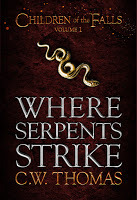
Where Serpents Strike
Children of the Falls, Vol 1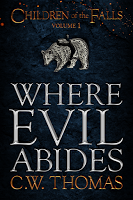
Where Evil Abides
Children of the Falls, Vol. 2
And this time, I didn't care about Stephenie Meyer and her crappy multi-million dollar novels. I wasn't writing to compete with her. Nor was I writing to impress some big publishing house. They could go play their money-grubbing marketing schemes all they wanted, preferably far away from me. I also decided I wasn't concerned about an audience. I had wasted too many years writing what I thought people wanted to read. It was clear to me that, good or bad, people would read anything, so trying to convince them that my work was superior to anyone else's was a waste of time.
I was writing for an audience of one—me. I was going to write my ultimate story. It would incorporate everything I love, take all the directions I wanted it to take, be as violent and scary and fantastical as I wanted it to be.
Sorry mom.
Children of the Falls actually began with an idea I had about nine years prior. The idea was simple: make an army of medieval super soldiers by training children from the youngest age possible. Think Spartan warriors meets kung-fu meets horror movies.
I had actually outlined a trilogy of books based on this premise called Edhen that I tinkered with over the years, but I was never satisfied with it. It served as the backbone to this new incarnation, expanding from three books to nine, from a trilogy spanning one continent with multiple kingdoms to three continents, dozens of kingdoms, multiple religions, languages, and cultures, and hundreds of characters.
It's been a fascinating journey, but something tells me it's just getting started.

Part 1: From Un-Me To Real Me: Discovering My Passion For Writing
Part 2: From Un-Me To Real Me: Writing For My Mother
Part 3: From Un-Me To Real Me: What I Learned From Horror Movies
Part 4: From Un-Me To Real Me: Giving Up On My Dreams
Part 5: From Un-me To Real Me: How Stephenie Meyer Killed My Muse
Part 6: From Un-me To Real Me: How Getting Laid Off Gave Me My Spark Back
Part 7: From Un-me To Real Me: The Birth of "Children of the Falls"
We now return to the exciting adventures of Craig William Thomas, his turbulent start as a writer, his hatred for all things Twilight, and how a dip into the waters of self-publishing re-ignited his passion for writing.
If you're truly passionate about something you can't give up on it. Even if you try, your passion won't let you.
I tried to ignore my passion for writing for six years—there had just been too many disappointments and unfulfilled expectations. I thought I was done. I thought my interest in writing was a phase that had come and gone.
But passions don't die.
My employer had recently cut my hours to 20 per week. On top of finding myself with extra time on my hands, a royalty check from Amazon for some ebooks I had self-published lit a spark under my butt.
And that's when my desire to write returned with a vengeance. Unbeknownst to me an entire cast of characters had been building in my brain and they had a lot to say! Once I started letting them speak they wouldn't shut up. For a year I wrestled with sleep, anxiety, and attention problems as these characters poured their souls out to me. I couldn't write fast enough. The story just flowed.
Children of the Falls was born.

Where Serpents Strike
Children of the Falls, Vol 1

Where Evil Abides
Children of the Falls, Vol. 2
And this time, I didn't care about Stephenie Meyer and her crappy multi-million dollar novels. I wasn't writing to compete with her. Nor was I writing to impress some big publishing house. They could go play their money-grubbing marketing schemes all they wanted, preferably far away from me. I also decided I wasn't concerned about an audience. I had wasted too many years writing what I thought people wanted to read. It was clear to me that, good or bad, people would read anything, so trying to convince them that my work was superior to anyone else's was a waste of time.
I was writing for an audience of one—me. I was going to write my ultimate story. It would incorporate everything I love, take all the directions I wanted it to take, be as violent and scary and fantastical as I wanted it to be.
Sorry mom.
Children of the Falls actually began with an idea I had about nine years prior. The idea was simple: make an army of medieval super soldiers by training children from the youngest age possible. Think Spartan warriors meets kung-fu meets horror movies.
I had actually outlined a trilogy of books based on this premise called Edhen that I tinkered with over the years, but I was never satisfied with it. It served as the backbone to this new incarnation, expanding from three books to nine, from a trilogy spanning one continent with multiple kingdoms to three continents, dozens of kingdoms, multiple religions, languages, and cultures, and hundreds of characters.
It's been a fascinating journey, but something tells me it's just getting started.

Part 1: From Un-Me To Real Me: Discovering My Passion For Writing
Part 2: From Un-Me To Real Me: Writing For My Mother
Part 3: From Un-Me To Real Me: What I Learned From Horror Movies
Part 4: From Un-Me To Real Me: Giving Up On My Dreams
Part 5: From Un-me To Real Me: How Stephenie Meyer Killed My Muse
Part 6: From Un-me To Real Me: How Getting Laid Off Gave Me My Spark Back
Part 7: From Un-me To Real Me: The Birth of "Children of the Falls"
Published on June 06, 2016 04:00
May 30, 2016
From Un-me To Real Me: How Losing My Job Gave Me My Spark Back
Part 6
If you're just tuning in, I've been recounting how I got started with writing novels at the age of 14, developed a love of horror movies, lost my spark when author Stephenie Meyer ruined my life, and ended up where I am today.
I always tell people, "If you want to get good at writing, go work for a newspaper."
Nothing will help you write faster, better, and conquer writer's block more quickly than having to write an 800 word story twenty minutes before deadline.
I know this from experience. I did it for five years.
Journalism was a good day job for me, but, as you may recall from my last entry, that was only until Stephenie Meyer, author of those soul-destroying Twilight books, crippled my interest in writing. Once that was dead, so was my passion for journalism.
So I moved into pagination, editing, and graphic design. My work caught the attention of a local marketing company that eventually hired me to be a full time graphic artist at their small publishing house. For years I designed book covers, illustrations, graphics, websites, business cards, digital books, book trailers, bookmarks, and much, much more. In fact I still work for them on a case-by-case basis today.
An itty-bitty sampling of my work.
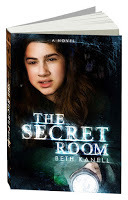


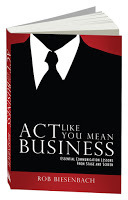
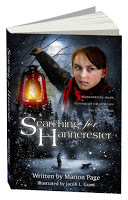
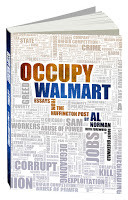
Seeing the world of publishing from the inside out was a unique experience. I began to see just what kinds of difficulties publishers faced, how it has become a challenge for them to make a book successful, and how risky it is to spend months—maybe even years—preparing to launch a new author's work.
I also realized just how hard it was for an author to make a living writing books. Most of our authors went nowhere. Most of them suffered from what I perceive to be the biggest misconception among writers today—being a successful writer isn't about creating good writing, it's about marketing. There are tons of great writers out there, but few of them will ever be successful because they don't know how to market.
Our writers promised us all sorts of things.
"I have a huge email list that I'm going to use to promote the book."
"I've got thousands of fans on Twitter and Facebook, and I'm going to market to them!"
"I'm going to travel around to bookstores and libraries with my book."
"I'll use my professional speaking platform to spread the word about my book."
But few of them actually followed through. Once the book came out, the excuses started tumbling in.
"I'm just too busy right now."
"My speaking engagements are really for my book."
"My email list is technically for my company, not myself."
"I didn't really have a good marketing plan."
"I don't know what to do!"
So the little marketing/publishing company that I worked for found itself losing lots of money. They couldn't afford to keep me on staff, but they didn't want to let me go either. They decided to cut my hours to part time while they reevaluated their business in hopes of hiring me back again if/when things picked up.
And then I found myself with about 20 extra hours a week on my hands. I spent some of it investing in some projects around the house that needed tending, and I did eventually get a part time job driving package trucks for UPS to help make ends meet.
But the real kick in the brain pan came when I got an unexpected check from Amazon.

Remember those two books I co-authored with my friend Mitch?
Well, after our publishing company failed to uphold their end of our contract, we asked for our books back. They begrudgingly agreed. Then, in an attempt to please our minuscule number of fans, we re-published the books on our own. (I had spent enough years designing books that setting them up was a breeze.) And the ebooks sold like hot cakes!
And that check from Amazon? It was almost enough to pay the mortgage that month. Wowzers!
I used to think there was no money in writing novels, but I was wrong. There was money to be had, but the method of getting it had changed.
My muse was coming alive again.
To be continued...

If you're just tuning in, I've been recounting how I got started with writing novels at the age of 14, developed a love of horror movies, lost my spark when author Stephenie Meyer ruined my life, and ended up where I am today.
I always tell people, "If you want to get good at writing, go work for a newspaper."
Nothing will help you write faster, better, and conquer writer's block more quickly than having to write an 800 word story twenty minutes before deadline.
I know this from experience. I did it for five years.
Journalism was a good day job for me, but, as you may recall from my last entry, that was only until Stephenie Meyer, author of those soul-destroying Twilight books, crippled my interest in writing. Once that was dead, so was my passion for journalism.
So I moved into pagination, editing, and graphic design. My work caught the attention of a local marketing company that eventually hired me to be a full time graphic artist at their small publishing house. For years I designed book covers, illustrations, graphics, websites, business cards, digital books, book trailers, bookmarks, and much, much more. In fact I still work for them on a case-by-case basis today.
An itty-bitty sampling of my work.






Seeing the world of publishing from the inside out was a unique experience. I began to see just what kinds of difficulties publishers faced, how it has become a challenge for them to make a book successful, and how risky it is to spend months—maybe even years—preparing to launch a new author's work.
I also realized just how hard it was for an author to make a living writing books. Most of our authors went nowhere. Most of them suffered from what I perceive to be the biggest misconception among writers today—being a successful writer isn't about creating good writing, it's about marketing. There are tons of great writers out there, but few of them will ever be successful because they don't know how to market.
Our writers promised us all sorts of things.
"I have a huge email list that I'm going to use to promote the book."
"I've got thousands of fans on Twitter and Facebook, and I'm going to market to them!"
"I'm going to travel around to bookstores and libraries with my book."
"I'll use my professional speaking platform to spread the word about my book."
But few of them actually followed through. Once the book came out, the excuses started tumbling in.
"I'm just too busy right now."
"My speaking engagements are really for my book."
"My email list is technically for my company, not myself."
"I didn't really have a good marketing plan."
"I don't know what to do!"
So the little marketing/publishing company that I worked for found itself losing lots of money. They couldn't afford to keep me on staff, but they didn't want to let me go either. They decided to cut my hours to part time while they reevaluated their business in hopes of hiring me back again if/when things picked up.
And then I found myself with about 20 extra hours a week on my hands. I spent some of it investing in some projects around the house that needed tending, and I did eventually get a part time job driving package trucks for UPS to help make ends meet.
But the real kick in the brain pan came when I got an unexpected check from Amazon.

Remember those two books I co-authored with my friend Mitch?
Well, after our publishing company failed to uphold their end of our contract, we asked for our books back. They begrudgingly agreed. Then, in an attempt to please our minuscule number of fans, we re-published the books on our own. (I had spent enough years designing books that setting them up was a breeze.) And the ebooks sold like hot cakes!
And that check from Amazon? It was almost enough to pay the mortgage that month. Wowzers!
I used to think there was no money in writing novels, but I was wrong. There was money to be had, but the method of getting it had changed.
My muse was coming alive again.
To be continued...

Published on May 30, 2016 04:00



